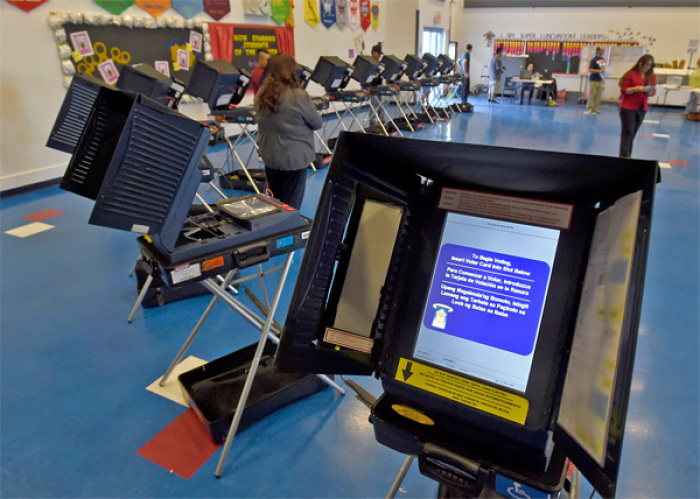New poll shows Kansas voters leaning toward supporting pro-life ballot measure

A new poll reveals that a plurality of Kansas voters are likely to support a ballot initiative that would declare that the state’s constitution does not contain a right to abortion.
A survey conducted by co/efficient released Monday asked 1,557 Kansas voters for their thoughts on abortion and specifically, whether they planned to support the Value Them Both Amendment. On Aug. 2, the Value Them Both Amendment will appear on the ballot as Kansans head to the polls for the state’s primary election.
The proposal would amend the state constitution’s bill of rights to make clear that “the constitution of the state of Kansas does not require government funding of abortion and does not create or secure a right to abortion.”
An explanatory statement will appear on the ballot noting that “The Value Them Both Amendment would reserve to the people of Kansas, through their elected state legislators, the right to pass laws to regulate abortion because there is no Kansas constitutional right to abortion or require the government funding of abortion.” The ballot will also indicate that a vote against the amendment would “leave in place the newly discovered right to abortion first recognized” by the state Supreme Court in 2019.
The co/efficient poll, based on responses collected from July 17-18, found that 47% of likely primary election voters planned to vote in favor of the Value Them Both Amendment, while 43% said they intended to vote against it. The remaining 10% were undecided.
In addition to predicting a close vote on the Value Them Both amendment, the co/efficient poll showed Kansas voters find themselves divided on the issue of abortion. Overall, 49% of respondents expressed agreement with the United States Supreme Court’s Dobbs v. Jackson Women’s Health decision that overturned the Roe v. Wade decision legalizing abortion nationwide. Forty-six percent of those surveyed disagreed with the decision, while 5% were unsure how they felt about it.
When asked to describe their position on abortion, 43% of likely Kansas primary voters agreed with a statement proclaiming that “there should be no government restrictions on abortion.” An additional 19% believed that “abortion should only be allowed in cases of rape, incest or to save the life of the mother.” Sixteen percent thought that “non-medically necessary abortion in Kansas should be legal but not past viability of the fetus.”
The remainder of voters either supported abortion to “save the life of the mother” (7%), banning abortions “after a heartbeat is detected” (6%), wanted to see abortion “banned under any circumstance” (5%) or were “unsure” of their position (5%).
While most Kansas voters supported legal abortion in at least some cases, a majority (54%) opposed the use of government funds to provide abortions for “those that need assistance.” Additionally, more voters reported trusting Republicans (52%) than Democrats (37%) to handle the abortion issue.
The Value Them Both amendment is one of several abortion-related ballot initiatives that voters will have the opportunity to weigh in on at some point this year. A similar amendment will go before Kentucky voters on November’s general election ballot. The proposed amendment states that “to protect human life, nothing in this Constitution shall be construed to secure or protect a right to abortion or require the funding of abortion.”
Kentucky is one of several states where abortion has become illegal following the Dobbs ruling. In recent years, voters have approved ballot measures clarifying that their state constitution does not contain a right to abortion in Alabama, West Virginia and Louisiana.
In Michigan, the organizers of the Reproductive Freedom for All campaign to amend the Michigan Constitution to establish a right to abortion announced last week that they had collected the number of signatures required for the issue to appear as a question on November’s general election ballot.
Yup, you read that right: our ballot measure campaign submitted 753,759 signatures. Not only is this well over the 425,059 required signatures, our campaign has ALSO set a historic record for the ballot measure in Michigan!! (1/3) pic.twitter.com/1S5wwVFGLm
— Reproductive Freedom for All (@mireprofreedom) July 11, 2022
The pro-abortion Guttmacher Institute identifies Michigan as one of several states with an unenforced abortion ban that will take effect in the absence of Roe, although a court order has prevented it from taking effect. Additionally, the state’s Democratic Attorney General Dana Nessel has vowed not to enforce the law.
WATCH: Michigan Attorney General Dana Nessel says she will “refuse to enforce” the state’s existing abortion law if Roe is overturned. #MTP@dananessel: “This incredibly draconian and strict, 1931 law would criminalize abortion in this state with virtually no exceptions.” pic.twitter.com/HLLHKYz7vV
— Meet the Press (@MeetThePress) May 8, 2022
Meanwhile, in California, which has already codified a right to abortion to the point of viability into state law, voters will decide the fate of Proposition 1. If approved by voters in November, the California Constitution will be amended to read, “The state shall not deny or interfere with an individual’s reproductive freedom in their most intimate decisions, which includes their fundamental right to choose to have an abortion and their fundamental right to choose or refuse contraceptives.”
“This section is intended to further the right to privacy guaranteed by Section 1, and the constitutional right to not be denied equal protection guaranteed by Section 7. Nothing herein narrows or limits the right to privacy or equal protection,” the proposed amendment continues. If passed, Proposition 1 would codify a right to obtain an abortion beyond the point of viability into the California Constitution.
Vermont’s Proposal 5, slated to appear on the ballot in November, will ask voters to amend the state’s constitution to read as “an individual’s right to personal reproductive autonomy is central to the liberty and dignity to determine one’s own life course and shall not be denied or infringed unless justified by a compelling State interest achieved by the least restrictive means.”
Vermont law already “recognizes the fundamental right of every individual who becomes pregnant to choose to carry a pregnancy to term, to give birth to a child, or to have an abortion.”
Ryan Foley is a reporter for The Christian Post. He can be reached at: ryan.foley@christianpost.com





























